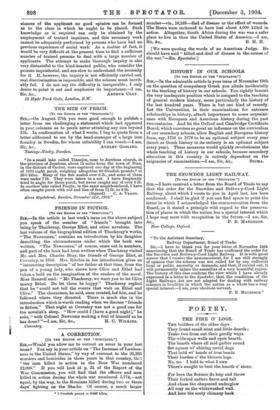the article in last week's issue on the above subject
you speak of the number of " friends " brought into being by Thackeray, George Eliot, and other novelists. The last volume of the biographical edition of Thackeray's works, "The Newcomes," contains an introduction by his daughter describing the circumstances under which the book was written. "The Newcomes," of course, came out in numbers, ana part of the book had been written when Thackeray visited Mr. and Mrs. Charles Bray, the friends of George Eliot, at Coventry, in 1856. Mrs. Ritchie in her introduction gives an "interesting description" of her father at that time, from the pen of a young lady, who shows how Clive and Ethel had taken a hold on the imagination of the readers of the novel. Miss Hennall said: "Mr. Thackeray, we want you to let Clive marry Ethel. Do let them be happy." Thackeray replied that he "could not tell the events that wait on Ethel and Clive." The characters, he said, once created, led him, and he followed where they directed. There is much else in the introduction which is worth reading when we discuss "friends in fiction." That night at Coventry was not a good one for the novelist's sleep. "How could I [have a good night]," he asks, "with Colonel Newcome making a fool of himself as he
has done? "—I am, Sir, &c., H. C. Wualuis. Coventry.
[TO THE EDITOR OP THE " Srearsroa."]






































































 Previous page
Previous page